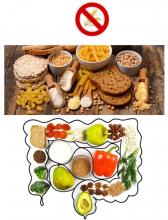Description Developing a mechanistic understanding of the impact of food structure and composition on human health has increasingly involved simulating digestion or in vitro gastrointestinal (GI) tract models (INFOGEST static) in the upper GI. The model is designed to be used with standard laboratory equipment and requires limited experience to encourage a wide range of researchers to adopt it. It is a static digestion method that uses constant ratios of meal to digestive fluids and a constant pH for each step of digestion. Using this model, food samples are subjected to sequential oral, gastric, and intestinal digestion and, subsequently, fermented in the colon. The method can assess the endpoints resulting from the digestion of foods by analyzing the digestion products (e.g., bioactive compounds, peptides/amino acids, fatty acids, simple sugars) and evaluating the release of micronutrients from the food matrix. It also helps assess the bioaccessibility of small amounts of contaminants in food, such as heavy metals, environmental pollutants, or mycotoxins. The in vitro GI digestion model is an effective tool for evaluating the bioaccessibility of bioactive compounds because it simulates the oral, gastric, and small intestinal phases and, occasionally, fermentation in the colon. It can closely mimic human upper intestinal digestion and recreate the colonic environment similar to human in vivo conditions. It is increasingly being utilized to predict peptide digestibility and microbiome analysis and assessment of health-related metabolites and probiotics. Some food products possess a protein called gluten that is responsible for celiac disease. Celiac disease is an autoimmune disorder that is triggered by consuming gluten-containing grains produced from wheat, rye, barley, and triticale. Undigested gluten peptides initiate immune and inflammatory responses. The worldwide prevalence of diet-related diseases has been on the increase for the past few decades. Globally, approximately 1% of the population is diagnosed with this disease, but regional prevalence may vary. Intestinal lining damage with the disappearance of the villi, resulting in a flattened surface, and nutrient absorption limitations that cause deficiencies are the other symptoms of the disease. The only remedy is a lifelong adherence to a strict gluten-free diet or applying a novel approach to food preparation. This seminar will deliver an overview of the In vitro GI models for the health potential of foods and the innovative development of gluten-free foods for celiac disease.

Dr. Elena Peñas, who is a researcher at the Institute of Food Science, Technology, and Nutrition (ICTAN), the Spanish National Research Council (CSIC), Spain, Madrid, will give a detailed update about the innovative development of gluten-free foods for celiac disease.

Dr. Cristina Martinez-Villaluenga, a researcher at the Institute of Food Science, Technology, and Nutrition (ICTAN), the Spanish National Research Council (CSIC), Spain, Madrid, will address In vitro GI models for the health potential of foods. The audience will have an opportunity to interact with the speakers during the Q&A session. ***** Introduction: Dr. Aregash Samuel, NIPN Ethiopia National Coordinator, Senior Researcher at the Nutrition, Environmental Health and Non-communicable Disease Research Directorate, EPHI Moderator Dr. Endale Amare, Head, of the Nutrition and Food Science Division, at the Nutrition, Environmental Health and Non-communicable Disease Research Directorate, EPHI Speakers: Dr. Elena Peñas, Researcher at Institute of Food Science, Technology and Nutrition (ICTAN), The Spanish National Research Council (CSIC), Spain, Madrid Dr. Cristina Martinez-Villaluenga, Researcher at the Institute of Food Science, Technology and Nutrition (ICTAN),The Spanish National Research Council (CSIC), Spain, Madrid ***** Time: 10:00 AM-11:30 AM Venue: NTC, EPHI *****
Join Zoom Meeting https://zoom.us/j/96179941697?pwd=TepLqSDLYGBfBnrcenO18oJ9M1eBN7.1 Meeting ID: 961 7994 1697 Passcode: 878003




